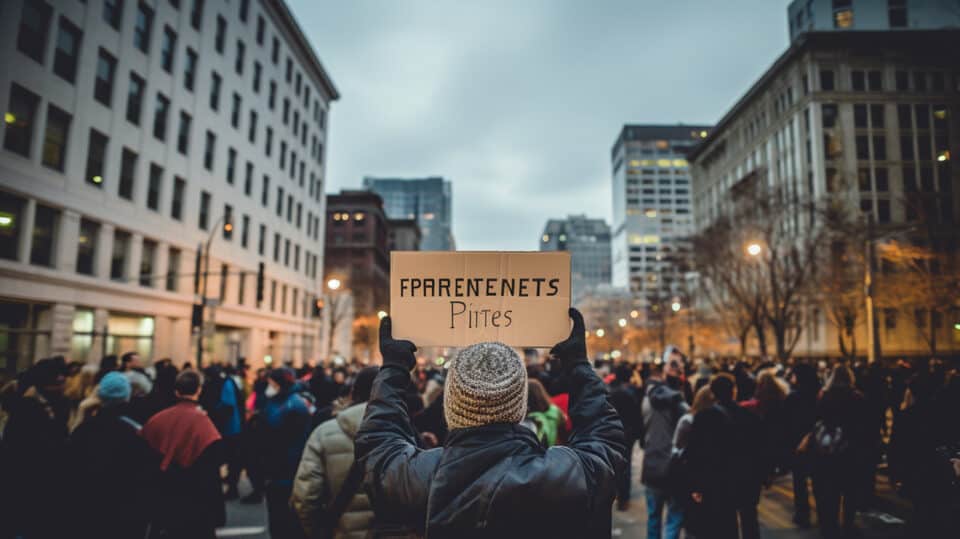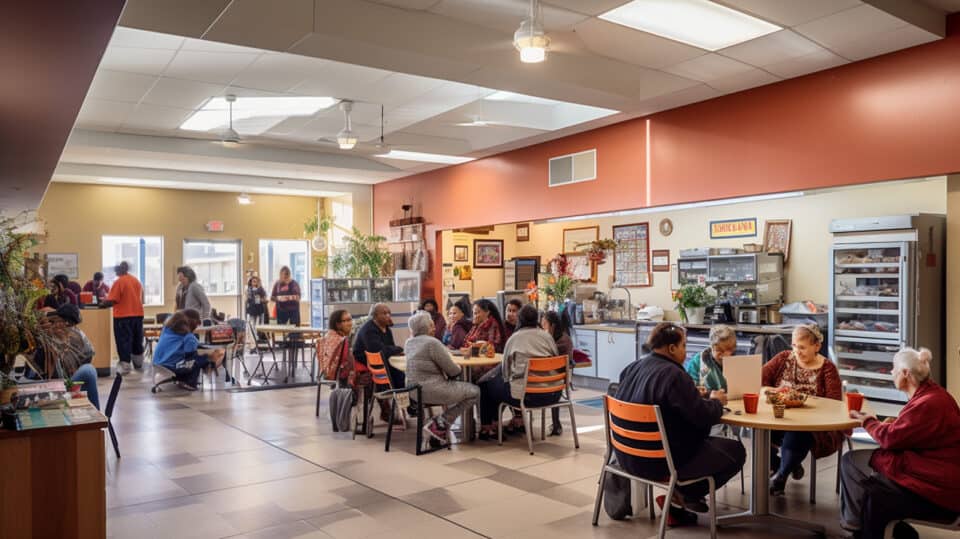Living under the shadow of homelessness is a profound experience that can trigger restless nights and intense anxiety. I know this sense of worry all too well, and my research has revealed that an astonishing 28% of Americans have also grappled with the fear of ending up without a roof over their heads at some point in their life.
This article aims to illuminate practical steps to skirt the edges of impending homelessness – from savvy financial management strategies to harnessing available resources and assistance programs.
Are you ready to reclaim your peace of mind? Let’s journey together to understand how we can fortify ourselves in trying times!
Key Takeaways
Saving money helps to stop being homeless. You need to create a budget and stick with it.
There are federal and private programs that help people in hard times. They often offer money for rent or utilities, job search support, and even places to stay.
Local groups also help people at risk of being homeless. They can give career advice, mental health support, and more.
Don’t hesitate to ask for help if you’re close to losing your home. Contact family, friends, or local organizations who want to assist during tough times.
Table of Contents
Understanding the Causes of Homelessness

Homelessness can arise due to several factors, including financial struggles and a lack of support systems. It’s important to recognize how these challenges could potentially lead you down the path toward becoming homeless.
Financial hardships often occur due to job loss, sudden unexpected expenses, or owing more than you can pay in rent or mortgage payments. A lack of a supportive network also contributes to homelessness, as individuals may not have friends or family who can provide temporary shelter during difficult times.
Understanding these causes aligns us with strategies on how to prevent homelessness from happening in the first place.
Financial Struggles
Money problems can put a roof over your head at risk. It could be due to job loss, low pay, or sudden big bills. You might find it hard to make ends meet in pricey cities, too. If you fail on rent payments or mortgage payments, you may lose your home.
This is why many people end up without a place to live. Yet some help is out there for folks facing this crisis. Some groups, like the U.S. Department of Housing and Urban Development, offer aid programs such as the Emergency Rental Assistance Program to save homes from being lost.
Lack of Support System
Being alone can make a hard time even harder. Often, people become homeless because they don’t have help from friends or family. These are the folks in our lives who step up when we fall in bad times.
They give us a place to stay, food to eat, and lend us money if we need it. But not everyone has such support around them. You may live far away from your loved ones or just not get along with them.
Maybe they are going through their own tough times and can’t help out much. It could be that you live in an expensive city where everyone is stretched thin already – this all adds strain on these important support networks! In those cases, seeking help from local community resources like charities or non-profit organizations becomes really crucial as they offer services for those at risk of becoming homeless.
Financial Management to Avoid Homelessness

Financial management plays a critical role in preventing homelessness. The first step is recognizing the importance of saving – even small amounts can accumulate over time and provide a safety net during tough times.
Drafting a budget is essential, detailing all your income and expenses to help pinpoint areas where you can cut back or save more. Smart spending habits involve weighing needs against wants; unnecessary purchases today could lead to financial hardship tomorrow.
It’s crucial to stay committed to your plan, adjust as necessary, and remember that every dime saved takes you further away from the risk of homelessness.
Importance of Saving
Saving money is a big help to stop being homeless. It helps pay for places to live, bills, and other things we need. To keep out of debt and not lose our homes, saving is key. Being smart with our money also matters.
We need to know where all our money goes so we don’t run out too soon. After all, having enough saved up can make it easier to move into a new place when needed!
Creating a Budget
I know how scary it is to be close to homelessness. But I want you to remember that making a budget can help keep you from losing your home. Here are some steps:
- Find out how much money you make each month. This includes pay from jobs, support money, or benefits.
- Make a list of all the things you spend money on. This could be rent or mortgage payments, food, clothes, and bills.
- Put these costs into two groups: “needs” and “wants”. Needs are things like housing and food that you must have. Wants are things like movie tickets or new shoes that are nice but not necessary.
- Look at your wants list and see what you can stop buying for now.
- The money left after paying for your needs is what you have for saving.
Smart Spending Habits
I want to talk about smart spending habits. They are key to saving money. Here are some tips that could help you.
- Track your expenses: Keep an eye on where your money goes.
- Cut unnecessary costs: Skip fancy coffees and dining out.
- Stick to a shopping list: It helps to stop impulse buying.
- Buy in bulk: Large packs of food or household items often cost less per item.
- Avoid late payment fees: Pay your bills on time.
- Compare prices before you buy: Look for the best offers and discounts.
- Prioritize needs over wants: Buy things like rent, utilities, and groceries first.
- Limit credit card use: It increases the risk of debt.
Utilizing Available Resources and Assistance

There are various programs in place to help those at risk of homelessness. Federal homeless assistance programs, such as the U.S. Department of Housing and Urban Development, offer support for individuals experiencing financial hardship.
Private homeless assistance organizations also exist, offering aid like emergency rental assistance and tenant rights protection advice. Don’t overlook local community resources either – they often provide immediate relief through food banks, medical care services, or temporary shelter options; reach out to them before desperation hits home.
Federal Homeless Assistance Programs
I want to talk about Federal Homeless Assistance Programs. These programs are here to help you when you are facing hard times.
- The first one is the Emergency Rental Assistance Program. This program gives money to people who can’t pay rent or utilities.
- There’s also the Continuum of Care Program. It helps homeless people get housing and needed services.
- Another good one is the Emergency Solutions Grant Program. This helps you with money for rent, a place to stay, and fixing up your home.
- Then there’s the HUD – Veterans Affairs Supportive Housing Program. If you’re a veteran, this program gets you support from both housing and veteran groups.
- And last but not least, we have the Title V Program. This one takes federal land and buildings that aren’t being used and turns them into homes for homeless people.
Private Homeless Assistance Programs
You should know about private homeless assistance programs. They can help you when you need it the most. Here are some:
- Goodwill: This program helps people find jobs. You can get help with your resume and job search. They have sites in the U.S. and Canada.
- Salvation Army: They provide many types of help. This includes clothes, food, and shelter.
- Catholic Charities: This group gives many forms of aid to needy people.
- Volunteers of America: They also give support to those who are in hard times.
Local Community Resources
I want to share with you some local community resources that can help. Local groups play a key part in stopping homelessness. They give us the help we need.
- Goodwill: This group gives career help in the United States and Canada. They show us how to grow in our jobs.
- Shelters: These places offer more than just a roof over your head. They also provide tools for job hunting, career guidance, and help if you have kids.
- Online Job Search Engines: Sites like Monster or Indeed can help find jobs nearby. You can choose what kind of work you want.
- Use of Local Organization Addresses: If you don’t have a home, you can use an organization’s address on your resume or job form.
- SAMHSA: This government group gives info on mental health problems, how to treat them, and stories to help cope.
Steps to Take When Facing the Risk of Homelessness

When the risk of homelessness looms, it’s crucial not to ignore your creditors; reach out for help and stay committed to a solid financial plan. Explore more steps you can take in this blog post!
Reach Out for Help
Asking for help is a brave step. It’s okay to share your problems with others. You might be surprised by how much people want to help you out of a tough spot. You can start with family and friends or talk to support workers at places like Goodwill, who are trained to assist during hard times.
They understand what you’re going through and can offer helpful tips and resources.
Don’t Ignore Creditors
If you miss a rent or mortgage payment, speak up right away. Your bank or landlord may be willing to work with you if they know your situation. Maybe they will give you extra time to make the payment.
You need to let them know what’s happening as soon as possible though. Don’t hide because of fear or shame; talking can help you keep your home.
Stay Committed to Your Financial Plan
Setting up a good money plan is one step. Sticking to it is another big step. It’s easy to get off track when times are hard. You might feel like giving up your plan. But don’t do that! Keep on going and stay strong with your money plans.
You may have less money now than before. Still, do not stop planning how you will use the little you have left. Paying bills on time can save you extra charges. Be sure to set aside some of your cash for food, too! Staying true to your financial plan helps keep you safe from being without a home.
Job Seeking and Skill Development

Seeking stable employment is crucial to avoid homelessness. Start by looking for local work opportunities, even if they’re part-time or temporary. Be proactive about enhancing your skills; this could open the door to better job offers.
Consider resume-building workshops or interview training programs, which can make you more attractive to potential employers. Don’t overlook the benefits of continuing education and skill development courses – they may be a stepping stone to financial stability and independence.
Finding Local Work
I want to share some ways you can find local work. These tips can help you make money and avoid being homeless.
- Check out Goodwill. They have 162 centers across the U.S. and Canada. They can teach you about jobs. They can also help you plan your career.
- Go to local shelters or community groups. They often have tools to help you find a job. They may give you clothes to wear for interviews. Some of them even help with rides or child care if you have kids.
- Try online job sites like Monster or Indeed. These sites let you search for local jobs that match your skills and education needs.
- Use the address of a local group that gets mail for people without homes on your resume or job applications.
Enhancing Your Skills for Better Job Opportunities
Gaining more skills opens doors to better jobs. This is important to prevent becoming homeless. Here are some tips:
- Check out training programs: Places like Goodwill guide you on how to improve your skills.
- Look for free online courses: You can learn a lot from the internet without spending money.
- Get a mentor: A mentor can teach you what they know and help you grow in your career.
- Use local resources: Shelters or community groups often have job-search help and work guidance.
- Try online job sites: Websites like Monster or Indeed are great for finding local work.
- Practice makes perfect: Keep working on your skills so they keep getting better.
- Mental health matters, too: Reach out to groups like SAMHSA for help with mental health or substance abuse issues.
Importance of Emergency Fund

Having an emergency fund is your financial safety net, providing a crucial buffer in times of crisis. It’s not just about saving; it’s about securing peace of mind and financial stability when unexpected expenses occur, like car repairs or medical bills.
Building an emergency fund can be as simple as setting aside a small portion of your income every month, ensuring you are steadily prepared for any bumps in the road to avoid ending up homeless.
Don’t underestimate its value: this is the cash cushion that keeps hard times from evolving into homelessness.
Reasons to Have an Emergency Fund
An emergency fund is your cash safety net. It can cover bills, food, and rent if you lose your job suddenly. Imagine you get hurt badly and cannot work for weeks or months. Your emergency fund will pay for things until you can go back to work.
Having an emergency fund also means less worry about money. You’ll handle sudden car fixes or doctor bills with ease. An emergency fund gives peace of mind when times are hard. It’s like a shield that helps block bad luck from hitting you too hard financially.
How to Build an Emergency Fund
Having an emergency fund can save you from being homeless. Here’s how to start one:
- Figure out how much money you need to live for three to six months. This includes rent, food, bills, and other needs.
- Make a budget plan for every month. Cut down on things you do not really need.
- Save a small part of your income each time you get paid. Some people save ten percent of their paychecks.
- Set up automatic savings transfers with your bank if they offer it. This way, some money goes right into your savings each time you get paid.
- Ask for help if needed! There are financial advisors who can guide you through the process of building an emergency fund.
- Keep adding to the fund whenever possible, even if it’s just a few dollars at a time.
- Stay away from using this money unless there is an actual emergency that needs immediate attention.
Planning for the Future

Approach the future with a proactive attitude. Start by anticipating unexpected expenses; things can change in an instant! A car repair or medical bill shouldn’t derail your financial stability.
Develop a plan for retirement early on. Remember, it’s not just about getting by day-to-day but securing long-term comfort and peace of mind, too.
Preparing for Unexpected Expenses
Life can send us surprises we didn’t plan for. Costs like car repairs or medical bills may pop up out of nowhere. It’s important to have a plan for these situations. Start by putting money aside each month in an emergency fund.
Let’s aim to save enough money to cover three months of living costs. This will give you time and peace if something unplanned happens like losing your job or having a big bill arrive suddenly.
You’ll feel safer knowing that you are ready if life sends unexpected costs your way.
Planning for Retirement
Taking steps now for your future is smart. It can stop you from being homeless later. Here are some ways to start planning for retirement:
- Put money into a savings account every week or every month. Even a small amount will add up over time.
- Get to know about retirement plans like the 401(k) plan offered by many employers.
- If your job gives you a 401(k) plan, try to put the most money you can into it.
- Find out if your employer matches what you save in your 401(k). This is free money that can help you in retirement!
- Look at other ways to save, like an Individual Retirement Account (IRA). You can open an IRA at a bank or investment company.
- Learn about Social Security benefits. It’s not only for old people!
- If possible, pay off all debt before retiring – credit cards, loans, mortgages — so they won’t be hanging over your head when income drops in retirement.
- Consider getting financial advice from professionals who understand how to plan for the future.
Maintaining Positive Attitude and Self-presentation

Maintaining a positive attitude is crucial when facing homelessness, as overcoming this challenge often starts from within. It’s vital to manage stress and anxiety effectively during these difficult times.
Presenting yourself well to potential employers can help secure job opportunities faster, thus aiding your recovery from this situation. This includes investing in personal hygiene and grooming products even when finances are tight because making a good first impression can be the deciding factor in landing a job.
Coping with Stress and Anxiety
Stress and worry can be high when you face home loss. It’s a tough time. But don’t let these feelings hold your power. Keep telling yourself that things will get better. You are not alone in this struggle.
Try to calm down with deep breaths or by going for a calming walk. Stay active and eat healthy food to keep your body well during this period of change. Do things that make you happy and talk about how you feel with friends or family if they are around for support.
Presenting Your Best Self to Potential Employers
I know how hard it is to find a job, especially when you’re facing a tough time. Look your best at all times. Keep clean clothes for interviews. Shelters or community centers often give out clothing for this purpose.
Goodwill even offers help with finding the path to the right job for you. If you can, use online tools like Monster and Indeed to find work in your area that fits your skills and education level.
This helps show employers that you are serious about working; it also shows them what skills and talents you have.
Conclusion
Look! You have the power to stop homelessness. Start by knowing how money works and saving it. Find a good job and keep learning skills for better jobs. Lastly, stay strong, don’t lose hope, and always ask for help when you need it.
Frequently Asked Questions On How To Evade Homelessness
What is the first step to avoid homelessness during financial hardship?
The first step to prevent homelessness is to keep track of rent and mortgage payments. If you face a financial crisis, reach out for help early from programs like the Emergency Rental Assistance Program or HUD’s housing counseling.
How can I protect myself if my landlord wants to evict me?
Knowing your tenant rights protection can save you from eviction. Also, understanding eviction timelines helps you plan better. Ask for assistance from agencies like the National Council of State Housing Agencies.
Can nonprofit credit counseling agencies help with my mortgage payments?
Yes, they guide you through the foreclosure process and even suggest hardship programs by credit card companies or banks that don’t harm your credit score much.
Is there any way I could be prepared for unexpected job loss or unemployment?
Budgeting wisely and having an emergency savings account as a safety net helps when facing unemployment or other unforeseen circumstances such as serious mental illness or domestic violence situations.
What should I do if living in expensive cities makes it hard for me to pay bills?
You might consider earning extra money through side hustles, have regular creditor communication about payment issues, and seek government assistance. Another option would be to try to move locations.
Do places like homeless shelters provide job search aid, too?
Yes! Homeless shelters often work together with social services agencies, providing resources including resume-building tools, interview training, and skills education, helping individuals find stable employment opportunities, and ensuring future financial planning while also taking care of personal appearances & hygiene needs via access to clothes, care products, etc.

